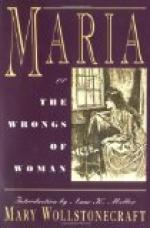Dryden’s Fables, Milton’s Paradise Lost, with several modern productions, composed the collection. It was a mine of treasure. Some marginal notes, in Dryden’s Fables, caught her attention: they were written with force and taste; and, in one of the modern pamphlets, there was a fragment left, containing various observations on the present state of society and government, with a comparative view of the politics of Europe and America. These remarks were written with a degree of generous warmth, when alluding to the enslaved state of the labouring majority, perfectly in unison with Maria’s mode of thinking.
She read them over and over again; and fancy, treacherous fancy, began to sketch a character, congenial with her own, from these shadowy outlines.—“Was he mad?” She reperused the marginal notes, and they seemed the production of an animated, but not of a disturbed imagination. Confined to this speculation, every time she re-read them, some fresh refinement of sentiment, or acuteness of thought impressed her, which she was astonished at herself for not having before observed.
What a creative power has an affectionate heart! There are beings who cannot live without loving, as poets love; and who feel the electric spark of genius, wherever it awakens sentiment or grace. Maria had often thought, when disciplining her wayward heart, “that to charm, was to be virtuous.” “They who make me wish to appear the most amiable and good in their eyes, must possess in a degree,” she would exclaim, “the graces and virtues they call into action.”
She took up a book on the powers of the human mind; but, her attention strayed from cold arguments on the nature of what she felt, while she was feeling, and she snapt the chain of the theory to read Dryden’s Guiscard and Sigismunda.
Maria, in the course of the ensuing day, returned some of the books, with the hope of getting others—and more marginal notes. Thus shut out from human intercourse, and compelled to view nothing but the prison of vexed spirits, to meet a wretch in the same situation, was more surely to find a friend, than to imagine a countryman one, in a strange land, where the human voice conveys no information to the eager ear.
“Did you ever see the unfortunate being to whom these books belong?” asked Maria, when Jemima brought her slipper. “Yes. He sometimes walks out, between five and six, before the family is stirring, in the morning, with two keepers; but even then his hands are confined.”
“What! is he so unruly?” enquired Maria, with an accent of disappointment.
“No, not that I perceive,” replied Jemima; “but he has an untamed look, a vehemence of eye, that excites apprehension. Were his hands free, he looks as if he could soon manage both his guards: yet he appears tranquil.”
“If he be so strong, he must be young,” observed Maria.
“Three or four and thirty, I suppose; but there is no judging of a person in his situation.”




